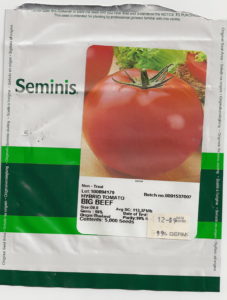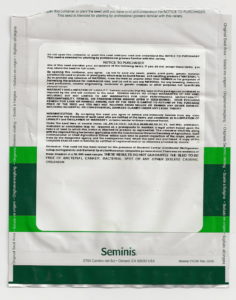
Five years ago, in February of 2005 I wrote an article regarding Monsanto’s purchase of the vegetable seed conglomerate Seminis. At the time many organic fresh market farmers relied on Seminis varieties. Since that time Monsanto has acquired additional vegetable seed companies, and continued to identify traits in vegetable crops for patenting. Some organic farmers and organic seed companies found replacements for Seminis varieties. However, speaking to farmers at conferences and field days, it is apparent that organic farmers are still buying Seminis products, particularly for tomato, cabbage, peppers, cauliflower, lettuce, and squash cultivars. This is in part because the infrastructure, skills, and investments necessary to develop and breed new varieties for organic agriculture have not developed adequately to be able to serve all the needs of organic growers. One reason new innovation and breeding is slow is due to concentration of resources in seed systems (Monsanto monopoly) and the utility patents that have been granted loosely and broadly that limit access to plant genetic resources for public and private sector breeders. I’ve spoken with university breeders who say they are afraid to breed in some vegetable crops due to the tsunami of patents for things as vague as “heat tolerance” in broccoli.
With organic farmers underserved by the public and private breeders and seed industry, some farmers have taken breeding into their own hands. OSA works with many such farmers, including some who have made selections from saving seed from hybrid vegetable material to develop new open-pollinated varieties. They do this because they fear that favorite varietals will be dropped (Copra onion from Bejo is an example of one such hybrid that organic growers have been loyal to, but has nonetheless been dropped). It is a common practice for breeders – both formally trained and farmers – to use existing varieties in their breeding efforts. Congress had a goal of stimulating breeding innovation when in passing the Plant Variety Protection Act they allowed for a breeders exemption to save seed. That exemption has been removed with the advent of utility patents, which disallow any form of seed saving for any purpose. Seed companies enforce their utility patents in a variety of ways, the most egregious being the thousands of threats and lawsuits Monsanto has brought against farmers for saving seed. Monsanto claims that they warn farmers of the law by placing a technology agreement (TLA) – a legal contract according to our courts – on each bag of seed that states that the farmer is agreeing to not save seed for any purpose, including breeding.
The TA and the lawsuits that come with it have been most noted in biotech crops, and even Monsanto’s own “Technology Use Guide” describes the licensing agreement for their biotech traits. However, we’ve recently been made aware that Monsanto owned Seminis has begun to place this TA on vegetable seed packets. Organic farmers, when you open your bag of Big Beef tomato or Speedway cucumber, please carefully read the licensing agreement you are making with Monsanto-Seminis by simply opening the bag. Unless you want Monsanto agents taking samples from your farm, suing you in court for thousands of dollars in patent infringement, and causing you to go into debt for legal counsel (regardless if you were guilty or not) you might want to think twice about ordering Seminis varieties from your seed companies this year. We’ve been made aware of new language on Seminis seed packets that you should be aware of as well, as it would indicate that the company has their eyes on enforcing their patents in vegetables, and they are informing farmers on the packet of seed in fine print – it’s information you should take as a warning as it makes your farm open to investigation and threats of the kind mentioned above.
At recent seed Organic Seed Alliance workshops at the MOSES Organic Farming Conference we heard several organic producers claim that in 2009 they started seeing a “Notice to Purchaser” on the back of their seed packets. We asked farmers to send us the packets. They did (see below), and indeed several of the standard hybrid varieties that we know organic farmers plant have the TA. If you are a farmer and have purchased Seminis seed and have these packets please consider either scanning and emailing to us, or mailing us the packet. It is not stated clearly, either in the catalogs that sell these varieties or on the packet, what patents have been applied to them. A search of patent database shows many Seminis patents, and in Speedway, for example, this could be a patent on resistance to certain races of CMS, but it is not clearly stated. Of course resistance to CMS has been in cucumbers long before Seminis began breeding them, and in fact is a natural biological trait that no human invented. We need to change patent law, demand the congressional judiciary committee investigates patents of biological life, to role these back. But in the meantime, consider not planting Seminis varieties.
The sick irony is that on the Seminis web site recognizes that they don’t invent the non-biotech traits they are patenting, yet our government still grants them patents (bold, italics, and underlines are mine): “Biodiversity is not just a concept for seed companies like Seminis. It’s one of our greatest assets, and the source of our innovation.Seminis has inherited the seeds and knowledge collected from more than 600 years of combined experience. Today, we are preserving 1.5 million breeding lines — one of the world’s largest collections of vegetable and fruit seeds, known as germplasm. In short, this diversity makes our work possible. We are always looking for new traits that are still locked in the vast reservoir of the wild relatives of cultivated vegetables. Today, Seminis is developing “super broccoli” with three times more cancer-fighting compounds than varieties currently grown. This breakthrough resulted from a trait discovered in a wild broccoli plant growing in the Mediterranean region.”
Here’s the front and back of the packet:
Please consider supporting the work of Organic Seed Alliance
– Matthew Dillon, OSA Director of Advocacy
March 15, 2010


